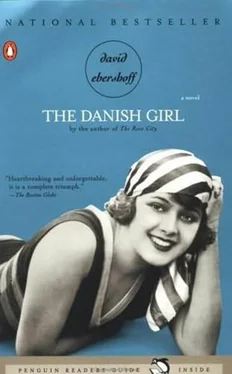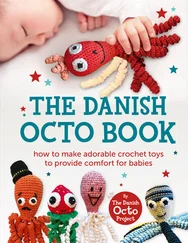When Einar moved closer to the window and peered across the room, both the boy and the man were gone. Suddenly Einar became embarrassed. How had he come to this-showing off his odd-shaped body, the camisole cupping his soft chest, his inner thighs pale and soft, silvery under the light, to a couple of strangers? He sat in the armchair on his pile of clothes, pulling his knees to his chest.
Then there was a light knock on the door, two taps. Then again.
“Yes?” Einar said.
“It’s me.” It was a man’s voice.
Einar said nothing, stayed still in the armchair. This was what he wanted more than anything in the world, but he couldn’t bring himself to say it.
Then another two taps on the door. His mouth was dry; his heart was climbing his throat. Einar wanted the man to know that he was welcome. Silent in the armchair, Einar wanted the man to know it was all right.
But nothing happened, and Einar thought the chance for… for something had fallen away.
Then the man quickly pushed himself through the door. He stood with his back pressed against it, his chest filling with breath. He was about Einar’s age, but white at the temples, whiskery. He had dark skin, a large nose. He was wearing a black overcoat, buttoned to the throat. Around him was a faint scent of salt. Einar remained seated, the man a foot or two away. He nodded. Einar brought his hand to his brow.
The man smiled. His teeth looked sharp, angled. He seemed to have more teeth than most men. The lower half of his face seemed to be all teeth. “You’re very pretty,” the man said.
Einar sank back in the chair. The man seemed to like what he saw. He unbuttoned his overcoat, split it open. Beneath he was wearing a businessman’s suit with a wide stripe in the wool. With the knot of his tie diamond-shaped, he was well groomed except for one thing: his fly was open and through it poked the eye of his penis.
He stepped toward Einar. Then another step. The head of his penis was peeking from beyond the foreskin. It smelled salty, and Einar began to think of the beaches of Jutland, of Skagen, where his mother was laid to sea in the fishing net picked clean of gills, and then the man’s penis was only inches from Einar’s mouth, and Einar closed his eyes. A blur of images ran through his head: the bay-inn with the seaweed roof, the bricks of peat stacked in the fields, the white boulder speckled with mica, Hans lifting Einar’s imaginary hair to tie the apron.
Einar’s mouth opened. He could almost taste something bitter and warm, and just as Einar’s tongue emerged from his mouth and the man took one final step closer, just when Einar knew for sure that Lili was here to stay and very soon Einar would have to disappear, just then there was a heavy knock on the door, and then another, and it was Madame Jasmin-Carton, yelling for them to come out at once, yelling angrily, in disgust, with her Manx cat mewing as violently as her mistress, as if someone had just stepped on her long-lost tail.
It was early afternoon when Einar emerged from Madame Jasmin-Carton’s. She had given him less than a minute to dress and leave her premises forever. He was on the black street with his clothes rumpled and untucked and his necktie in his hand. The tobacco shop owner was standing in his door, picking at his mustache, eyeing Einar. There was no one else on the street. Einar had hoped that the man would be waiting outside Madame Jasmin-Carton’s, that they would go to the little café around the corner for a coffee and, perhaps, a carafe of red wine. But he wasn’t there, just the tobacco shop owner and a little brown dog.
Einar entered the pissoir. Its metal walls smelled wet. Next to the basin Einar straightened his clothes and tied his tie. The little brown dog followed Einar in, and begged.
For months Einar had been thinking about visiting the Bibliothèque Nationale, and at last he set out. It occupied a block of buildings, bordered by the rue Vivienne, the rue Colbert, the rue de Richelieu, and the rue des Petits-Champs. Hans had arranged for Einar’s ticket of admittance, writing the library’s administration on his behalf. The Salle de Travail des Imprimés, with its hundreds of seats, had a desk in the middle of the room where Einar had to fill out a bulletin personnel, registering the purpose of his visit: researching a lost girl. There he also wrote on slips of paper the names of books he wanted. The librarian behind the bureau was girlish, with downy cheeks and a shell-pink clip holding back her bangs. Her name was Anne-Marie, and she spoke so softly that Einar had to lean toward her face and smell her peanutty breath. When he handed her the slips of paper with the names of half a dozen scientific books on sexual problems, she blushed but then set out to do her job.
Einar sat down at one of the long reading tables. A student a few chairs down looked up from his notebook, then returned to his work. The room was cold, motes of dust in the lamplight. The long table was scratched. The sound of a page turning filled the room. Einar was worried that he looked suspicious, coming in here at his age, his trousers wrinkled, a faint sweaty scent sticking to him. Should he go find the washroom and look at himself in the mirror?
Anne-Marie delivered the books to his table. She said only, “We will be closing today at four.”
Einar ran his hand over the books; three were in German, two in French, the last from America. He opened the most recent, called Sexual Fluidity , published in Vienna, written by Professor Johann Hoffmann. Professor Hoffmann had performed experiments on guinea pigs and rats. In one, he grew breast glands in a once-male rat rich enough to feed a second rat’s litter. “Pregnancy, however,” Professor Hoffmann wrote, “remains elusive.”
Einar looked up from the book. The student had fallen asleep on his notebook. Anne-Marie was busy loading a cart. He thought of himself as the formerly male rat. A rat on its wheel running through his head. Now the rat couldn’t stop. It was too late. The experiment continued. What was it Greta was always saying? Worst thing in the world is to give up! Hands swatting through the air, silver bracelets jangling. She was always saying that, and: Come on now, Einar. When will you ever learn?
Einar thought of the promise he’d made to himself in the park last month: something would have to change. May had slipped into June, just as the months had slipped into years. More than four years ago, Lili was born on the lacquer trunk.
At four o’clock Anne-Marie rang a brass handbell. “Please leave your materials on the table,” she announced. She had to rock the shoulder of the student to wake him. To Einar, she pressed her lips together till they turned white and then nodded goodbye.
“Thank you,” he said. “You’ll never know how helpful this has been.”
She blushed again, and then said, a little smile emerging, “Should I set aside these books? Will you need them tomorrow?” Her hand, which was pale and no larger than a baby starfish, fell softly on Einar’s arm. “I think I know of some others. I’ll pull them for you in the morning. They might be what you’re looking for.” She paused. “I mean, if that ’s what you want.”

Much to Greta’s concern, Carlisle’s foot dragged through the gravel of the Tuileries. Each night he soaked his leg up to the knee in a tub of Epsom salt and white table wine, a balm his roommate at Stanford, who went on to become a surgeon in La Jolla, had first concocted. Carlisle had become an architect, building bungalows in Pasadena in orange groves that were being paved into neighborhoods. They were small houses, built for teachers at Pasadena Poly and Westridge School for Girls, for policemen, for the migrants from Indiana and Illinois who ran the bakeries and the printing shops along Colorado Street. He sent Greta pictures, and sometimes she put her chin in her fist and dreamed of one of the bungalows, with a screened-in sleeping porch and windows shaded by Blood of China camellia trees: not that she really saw herself settling into one of the little houses, but sometimes she wanted to stop and wonder.
Читать дальше













